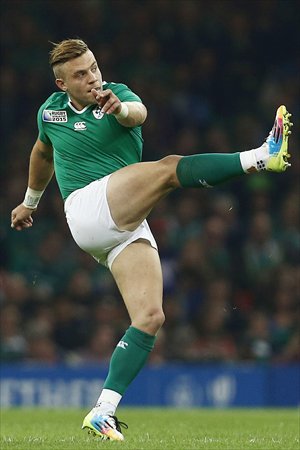HOME >> SPORTS
Rugby spans the sectarian divide
Source:Reuters Published: 2015-10-16 5:03:03
All-island team unifies fans from both sides of the Irish border

Ian Madigan of Ireland plays during the Rugby World Cup Pool D match against France in Cardiff, Wales on October 11. Photo: IC
As Ireland won their place in the Rugby World Cup quarterfinals, Catholics and Protestants sat side by side in Laverys bar in Belfast to cheer on an all-island team that for decades has brought together communities.Even at the height of a conflict that until 1998 pitted Catholics favoring a unified Ireland against Protestants who wanted to remain British, players from both sides of the Irish border have represented the old-established team.
"Rugby is looked at as more of a family thing," said James Hutchinson watching one of Ireland's games at Laverys, the south Belfast bar that has long welcomed both communities and has been packed throughout their World Cup games.
Unlike soccer where Northern Ireland and the Irish Republic field separate teams or individual sports where Northern Irish competitors often represent Britain, Ireland's World Cup squad contains players from Leinster, Munster, Connacht and Ulster, the province containing the six counties of Northern Ireland.
"There is no community difference in rugby. Ulster rugby players playing for Ireland is the most intertwining factor. It is a positive that they come together," said Hutchinson, a 24-year-old sales administrator, who is from a unionist background and supports Northern Ireland in soccer.
Around the corner from Laverys, Protestant murals and fluttering British flags of Belfast's Sandy Row area are a reminder that parts of British-controlled Northern Ireland remain riven with old enmity 17 years after a US-brokered truce.
In the past, the rugby team was affected by the "Troubles," a period during which 3,600 people were killed.
Backdrops of the troubles
On the eve of the 1987 World Cup, three Northern Irish-born players were on their way to training when a car next to them was blown up by the Irish Republican Army. They were not the target but injuries forced one of the players, Nigel Carr, to retire.
In 1972, security was such a concern across the island that Wales and Scotland refused to play in Dublin, forcing the then Five Nations championship, where countries alternate home and away games each year, to be abandoned.
England's decision to travel to Dublin a year later ensured that the 1972 tournament was the first and only to be cancelled since World War II.
"When I started, I remember we had Special Branch [police] guys with guns standing on the side of the training sessions," recalled former Ireland player Keith Wood, who captained the team from 1996 to 2003.
Citing the success of South Africa two decades ago, Ireland is drawing on what it calls the unifying power of rugby to host the 2023 Rugby World Cup for the first time.
"Things have thankfully moved on an awful lot. There is still a long way for that to go but if rugby can be of any additional benefit to that process, isn't that a great side effect to having a Rugby World Cup bid?" Wood told Reuters.
National identity in sport remains tricky for many Northern Irish sportsmen and women.
In rugby, whenever Ireland play away from home, a specially arranged song, "Ireland's Call," is played. For home games, the Irish national anthem, composed a century ago during the struggle for independence from Britain, is also sung.
'No boundaries with rugby'
Golfing star Rory McIlroy, who was born in Northern Ireland, attracted widespread media attention when he agonized over whether or not to opt for Britain when golf was introduced into the 2016 Olympic Games before deciding to represent Ireland.
McIlroy was in Belfast's Windsor Park last week to watch Northern Ireland in soccer - a team traditionally supported by those who identify themselves as being British. Three days later, McIlroy was in Cardiff as the rugby team beat France to set up a World Cup quarterfinal with Argentina on Sunday.
"I don't think there will be an all-Ireland soccer team in my lifetime," said financial services adviser Gerry Hagan, 32, a Republic of Ireland soccer fan from a nationalist background who was among the crowd at Laverys that reflected the wide appeal of rugby across the once deeply divided society.
In the Irish rugby team hotel last week, two televisions were required when the Republic were also playing a European Championship soccer qualifier at the same time Northern Ireland were reaching their first major soccer tournament in 30 years.
Ulster player Rory Best, one of five Northern Ireland-born players in Ireland's 31-man World Cup squad, said it was inspirational to watch both teams win.
"As long as some part of Ireland goes through in tournaments I am happy," said Sonya Rowan, a 26-year-old retail manager from Londonderry as she cheered on Best and his teammates from around the 32 counties of Ireland.
"There are no boundaries with rugby, no hassle."
Posted in: Feature, Rugby